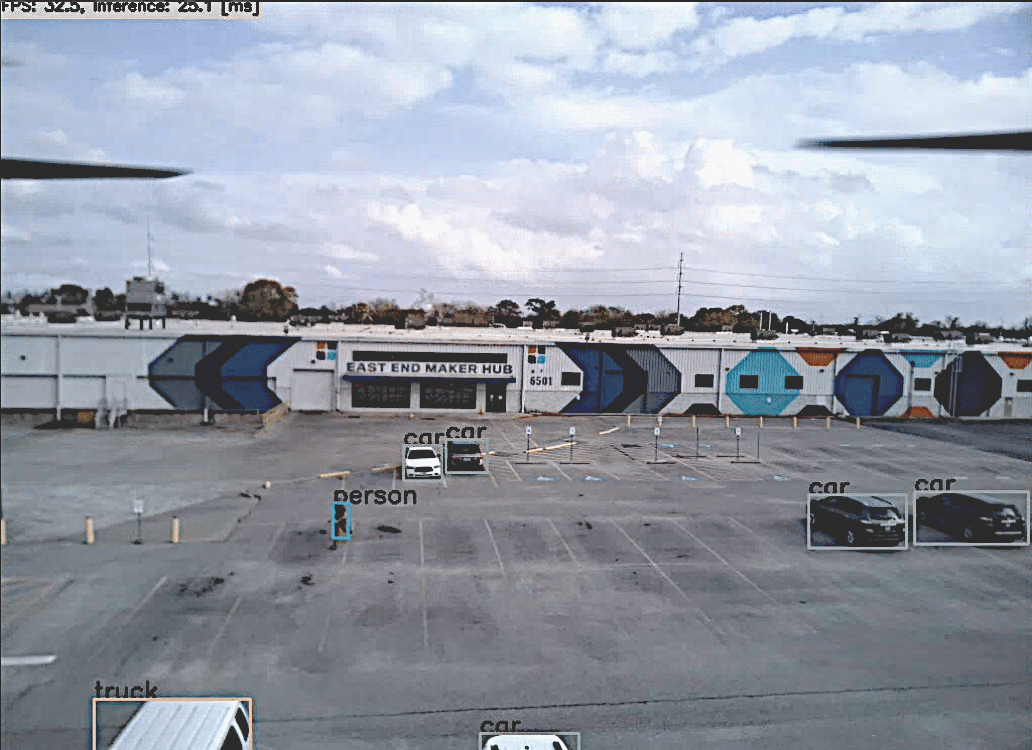From Concept to Reality: Horizon Aerobotics’ Revolution in Drones
April 9, 2024 | Dawn Zoldi|Akshata –

Houston, Texas-based Horizon Aerobotics Inc., an enterprise drone company, focuses on markets in public safety, defense, infrastructure and utility inspection and disaster response. In a recent episode of the Dawn of Autonomy podcast, Denver Hopkins, the company’s co-founder and CEO, discussed its research and development (R&D) initiatives to create more robust and secure drone solutions for real-world challenges. Read on to learn about the company’s approach to developing the most safe and reliable drones to solve modern challenges at enterprise scale.

The Origin
According to Hopkins, Horizon Aerobotics started with a focus on general aviation (GA) but shifted to unmanned aircraft systems (UAS) in early 2023. The idea for the shift came years prior during a discussion he had with co-founder Nick Sammons, a former Air Force officer, about what the commercial drone space would look like a decade down the road. They both knew, even back then, that drones would spur a revolution in aviation. They also believed their experience, safety focus and background in developing safety critical software and electronics would translate well from the GA world to the UAS industry.
“It’s largely true that if you build something useful for commerce, humanity will find ways to apply and use it,” Hopkins said, discussing the potential of drones across multiple commercial applications.
One of the first steps was to clarify the company’s mission of developing what they aim to be the most reliable and safest drones in the world for enterprises. Their product focus prioritizes portability, autonomy and leveraging Artificial Intelligence (AI) for Beyond Visual Line of Sight (BVLOS) missions. The company slogan, “When the mission matters most, nothing else compares” signifies their commitment to this mission.
The Technology
Horizon Aerobotics’ first commercial drone offering, the HX1, is focused on the needs of customers who value productivity, reliability and safety. The company has engineered the HX1 to be easily portable for Part 107 operations, but robust enough for the demands of commercial workloads. The integration of autonomy and AI makes for a rugged, intelligent UAS that enables rapid deployment and real-time situational awareness.
The HX1 folds to store compactly along with two batteries, a ground controller and maintenance tools, and can be deployed in under 60 seconds. The drone packs state-of-the-art sensor fusion, obstacle avoidance capability and the ability to detect and avoid (DAA) other aircraft, which enables it to conduct safer autonomous and BVLOS flights. Staying true to the company’s vision of drones as hyper-mobile flying computers, the drone also has built-in computer vision and an onboard AI processor that can run up to six deep neural networks at once. These enable real-time object detection and tracking in streaming video.
Also, in furtherance of flight safety and robustness, Horizon has engineered the HX1 to fly in GPS-contested, degraded and denied environments. This is especially important in places such as combat areas where there might be active jamming efforts. To ensure continuity of flight, Horizon partnered with Global Navigation Satellite System (GNSS) technology partners to integrate active anti-jamming, anti-spoofing and anti-interference capabilities from the start.
These same technologies also provide utility in the commercial space by helping drones function in areas where the environment might create issues for GPS, such as under large structures like bridges, indoors or in uniquely challenging environments such as mines and urban or natural canyons.
Although not yet Ingress Protection (IP) rated, the company aims for a minimum rating of IP54 (protected against interference by dust and splashing water). Hopkins stated, “We’ve been pushing for the highest IP rating we can achieve and will test and validate that eventually.”
In terms of mission robustness, the drone incorporates dual-band long-distance radios, backed up by 5G, instead of relying on more common Remote Controller (RC) or WiFi technologies.
Horizon has also planned for these capabilities to work at the level of performance and speed required by customers’ missions. “For example, we’ve spoken with numerous operators who have expressed frustration with having to wait, sometimes for minutes, to obtain a precision RTK (Real-Time Kinematic) adjusted fix before launching their missions,” Hopkins explained. “For first responders, every second counts. On the battlefield, every second counts. In logistics, depending on the cargo, seconds count too. And delays matter. We’re working diligently to deliver a platform that’s ready-to-go when you are and doesn’t sacrifice rapid deployment and execution for precision.”
In short, Horizon Aerobotics purposefully built its drone with a diverse range of capabilities to effectively address critical challenges for enterprises. Hopkins noted, “We’re not the only people working to solve these problems, but we are cramming a whole lot of capability into one drone. And this is just our first.”
Partnerships & Bright Horizons
No company makes a drone on its own, and Horizon Aerobotics is no different in that regard. Hopkins attributes much of the quality of the HX1 to the strong partnerships and integrations they’ve forged to help create it.
For example, Horizon gives credit to ModalAI, a Defense Innovation Unit (DIU) Blue Framework company that makes autopilots and onboard computers, for HX1’s impressive AI capabilities, and to Doodle Labs (another Blue UAS Framework company) for its primary radios. Yet another Blue UAS Framework company, UXV Technologies, based in Denmark, was selected for custom ground control stations. Blue UAS Framework company’s components and software are accepted by the U.S. Department of Defense, which ensures compliance with regulations and helps to provide non-foreign adversary sourced alternatives for the federal government.
Other robust technologies round-out the capabilities of the HX1, including GNSS technology from Septentrio that protects against spoofing and jamming, and propulsion components including motors and controllers from Swiss manufacturer Maxon.
Horizon is developing a growing network of partners, such as Houston, Texas-based Unspace LLC with whom the company is developing AI-enabled solutions for industrial safety, disaster response and community resilience challenges. The company also seeks alignment and partnership with global distributors and with qualified operators who depend on modern drone technology to solve complex challenges at scale.
These strong partnerships make the future even brighter for Horizon. Stay tuned for Horizon Aerobotics’ big reveal of the HX1, sometime in the second quarter of 2024. In the near term, you can catch Denver Hopkins in person at XPONENTIAL 2024 in San Diego.
To learn more about Horizon Aerobotics, contact Horizon Aerobotics.
Learn more from Denver Hopkins on the 2024 Dawn of Autonomy podcast.
- Podcast


